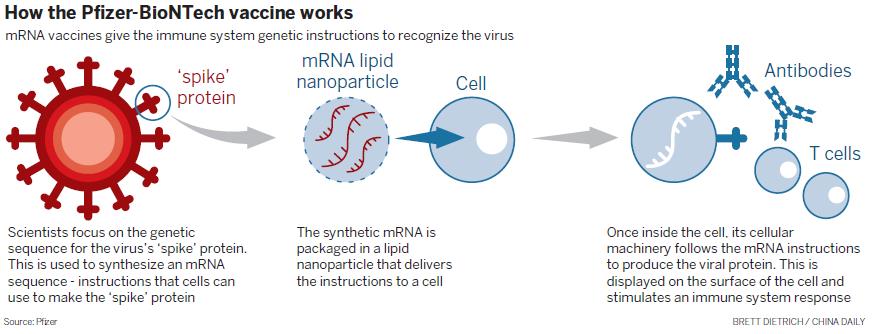Hurdles remain to be cleared as UK fires starting gun on mass vaccination
By ANGUS McNEICE in London | China Daily Global | Updated: 2020-12-03 11:01

But scientists warn that much work lies ahead. It may be worth asking the question: What if developing the vaccine was the easy part? The logistical challenge of manufacturing and disseminating treatments is enormous, especially in the case of the Pfizer vaccine, which requires storage at ultra-cold temperatures.
Developed countries like the UK will have an easier time distributing the Pfizer jab than nations that do not have robust cold-chain infrastructure, according to Robert Lechler, president of the Academy of Medical Sciences.
"The Pfizer-BioNTech COVID-19 vaccine does come with challenges such as storage at around minus 70 C which is why I am pleased that there are other promising vaccines that could be approved for use soon," Lechler said.
Some other COVID-19 vaccine candidates can be stored at higher temperatures for longer periods, including the so-called Oxford vaccine, which was shown to provide up to 90 percent protection in interim Phase 3 results published last month.
Chinese manufacturers have several vaccine candidates in the pipeline that do not require ultra-cold storage, including a treatment developed by Sinovac that produced a strong immune response in Phase 1 and Phase 2 testing, with results from largescale Phase 3 testing coming soon.
Vaccine makers from China have already agreed to deliver tens of millions of doses to numerous developing nations around the globe.
"Really, the way we are going to deal with this pandemic globally is by having a variety of vaccines available using different technologies, and, crucially, some of those need to not have cold-chain issues," said Andrew Catchpole, chief scientist at London-based vaccine testing lab hVIVO. "And this is not uncommon, most infectious diseases for which we have vaccines are actually collectively delivered by a number of different vaccine manufacturers."
Scientists have warned it is still unclear for how long the vaccine will provide protection, or whether people who are vaccinated will still be able to spread the virus.
"Today is a good news day, however, we do have to acknowledge several key things," said Stephen Evans, who is a professor of pharmacoepidemiology at the London School of Hygiene and Tropical Medicine. "We will not be able to change distancing, maskwearing etcetera for quite some time, months at least, and we don't yet know when or whether that will stop."
























